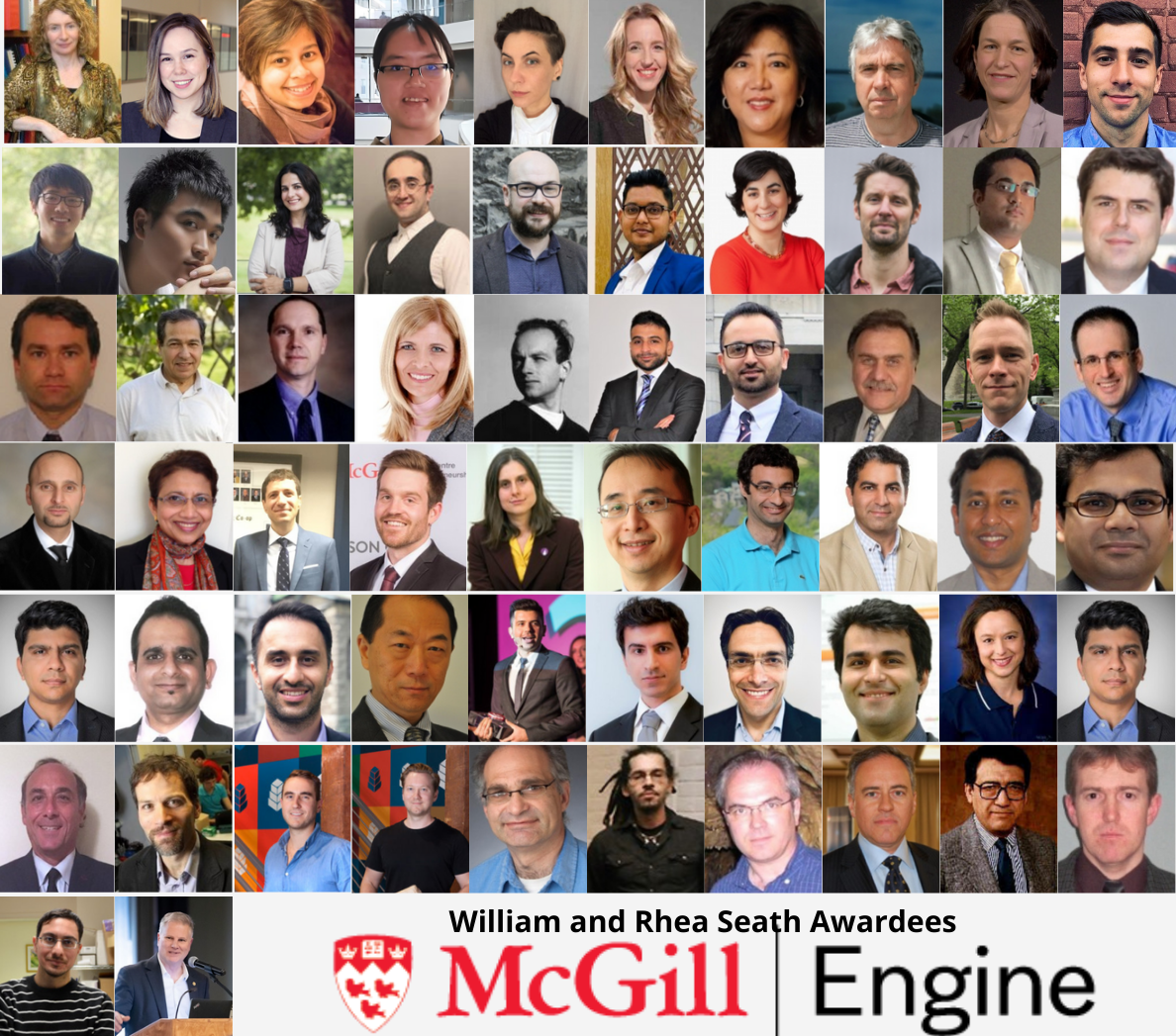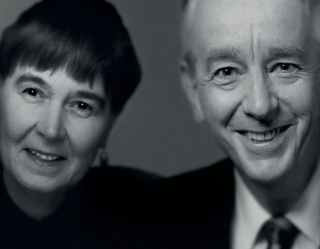William and Rhea Seath Awards in
Engineering Innovation
On this page: Eligibility/Requirements | Evaluation Criteria | How to Apply | Terms of the Award


The William and Rhea Seath Awards (WRSAs) have been made possible thanks to the generosity of Faculty of Engineering alumnus, the late Mr. William Seath (B.Eng. 1952). These awards support McGill University Faculty of Engineering tenure-track professors and their graduate students by enabling them to accelerate their technology that is reported as an invention but needs further validation prior to commercialization.
Up to two equal awards of $25,000 for projects up to 12 months is given as part of this annual competition. The $25K grant should represent 50-100% of the total project costs. (i.e. max total project cost is $50K for a 12-month project.) They are reviewed by the McGill Engine Director and awarded by the Dean of the Faculty of Engineering based on the recommendation of a committee composed of faculty, industry and alumni members. Recipients use the grant to further develop their technologies in conjunction with their commercialization plan. Examples of eligible support activities: development, testing, prototype construction, personnel costs (stipends, salaries & benefits). Successful applications demonstrate in a concise manner how the funds have a meaningful impact on commercialization advancement of their technology.
Program Objectives
- Validate early stage technologies (starting at TRL3-4)
- Advance the invention's Technology Readiness Level
- Accelerate the technology’s commercialization and development plan - achieve product-market fit faster
- Further develop the research to strengthen eligibility for additional funding
- Research team works closely with the assigned Ronald Chwang Entrepreneurs-in-Residence, gaining from their experience, knowledge, and industry connections
CURRENT 2026 CALL IS OPEN FOR PROJECT SUBMISSIONS.
WRSA Key Dates
| Date | Description |
|---|---|
|
July 5, 2026 at 11:59 PM ET |
Application deadline. Application form. |
| July and August | Applications are reviewed and evaluated. |
| Mid August | Applicants informed of review and evaluation outcomes. Winners announced. |
| September 1, 2026 | WRSA project begins |
| September 1, 2027 | WRSA project ends (projects can last up to 12 months, projects can be completed earlier) |
Eligibility/Requirements
-
Application: Late or incomplete applications will not be reviewed. You can send your draft application for review prior to the deadline to the Engine's associate director, katya.marc [at] mcgill.ca (subject: WRSAs%20Application%20Review) or to one of the Ronald Chwang Entrepreneurs-in-Residence. Since the proposal is co-written with your Technology Transfer Manager (TTM), please reach out to them well in advance of the submission deadline.
An application to be considered complete, it must include:
- Submitted online application form, including the confirmation of the proposal review and contribution by the TTM, and lead applicant's assessment on the Innovation Readiness Level indicators;
- Completed proposal;
- Completed budget form
-
Lead Applicant: McGill Faculty of Engineering tenure-track professors are eligible as lead applicants for the WRSAs. They are an inventor/co-inventor on an active report of invention(s) that is being further developed under the proposed project, and that is backed by McGill's OIP. One cannot hold another Engine gap funding grant (TechAccelR, Baylis Health Care Grant, Innovation Fellowship) for the same invention at the same time as this project grant. Team collaborators can be students and/or professors.
-
Invention: The technology must be reported as an invention to McGill's Office of Innovation and Partnerships. Your TTM’s assessment and commercialization plan will need to be included in this grant application. If a invention has already received funding from the Baylis Health Care Grant, then it is not eligible for funding under the William and Rhea Seath Awards in Engineering Innovation (WRSA) program.
-
Project Timeline: Projects can last up to 12 months maximum, projects can be completed earlier. The start date is September 1, 2026.
-
Project Expenses: Applicants must use the funds to advance the technology in accordance with their project technical milestones and commercialization plan. The McGill Engine team can make recommendations for changes to the budget and uses of funds that are required for the acceptance and funding of the project. Once the grant is awarded, if your milestones and project expenses change significantly from what was in your project proposal (e.g. greater than 10% on any allowed budget item), you must discuss with your mentor and provide the revised milestone(s) and budget to Engine's Associate Director for approval.
- Eligible Expenses:
- Product and process development costs towards achieving technical milestones, e.g., personnel (stipends, salaries & benefits), materials, small equipment.
- Non-Eligible Expenses:
- Costs related to non-technical milestones
- publication costs
- patent fees
- incorporation fees
- travel costs
- Costs related to non-technical milestones
Evaluation Criteria
-
Applications will be judged and ranked according to the following criteria: problem and commercial applications, proposed solution, prospective competitive advantages, technical feasibility, commercialization potential.
Each section of the application is scored as follows:
5 – Excellent The applicant has included all of the required information and has made a very convincing argument/answer to question.
4 – Above Average The applicant has included all of the required information and has made a reasonable argument/answer to question.
3 – Good The applicant has included most of the required information and has made a fair argument/answer to question.
2 – Fair The applicant has provided most of the required information but has not made a fair argument/answer to question.
1 – Poor The applicant has not provided enough of the required information to make a fair argument/answer to question.
How to Apply
-
Applicants will need to attach the following documents in the application form.
-
If you have any questions and/or wish to have your application reviewed prior to final submission, please contact katya.marc [at] mcgill.ca (subject: WRSAs%20Application%20Review)
Terms of the Award
-
Timeline: Teams have up to 12 months maximum to complete their project milestones and deliverables. Unused funds will need to be returned.
-
Award: The award will be dispersed into a new account under the PI and entitled W&R Seath Award. Once the grant is awarded, if your milestones and project expenses change significantly from what was in your project proposal (e.g. greater than 10% on any allowed budget item), you must discuss with your mentor and provide the revised milestone(s) and budget to Engine's Associate Director for approval.
-
Reporting: Mid-term and final reports are due to the Engine's associate director and the team's assigned mentor showing the project’s current status, status of IP, commercialization and development plan progress/next steps, and the use of funds.
-
Participation: Participate in surveys and requests for feedback in connection with the procedures and services provided by the McGill Engine, with the aim of collaborating in the continuous development of its global offer, research commercialization support, and student experience.
-
Mentorship & Training: Meet with assigned business mentor on an as appropriate basis throughout the program (minimum at the project start). Attend Engine's entrepreneurial skills development workshops or other entrepreneurial training as appropriate and suggested by mentor.
-
Outreach Activities: Willingness to assist the McGill Engine in outreach activities pertaining to technological innovation and entrepreneurship.
-
Promotion: Acknowledgement and promotion of the award and the McGill Engine in publications and communications arising from the project through your own networks and events.
-
Consent: Consent to the publication of your picture, name, as well as pictures and names of collaborators, the title of the project, and amount of funding.
-
Giving back: The McGill Engine does not take equity in McGill spin-off companies. There is an expectation, but no requirement, that participating researchers will make a non-binding charitable pledge to McGill Engine aimed at sustaining the activities of the McGill Engine Centre and helping the next generation of technological innovators and entrepreneurs that the Centre supports. Funding is not conditional on a researcher signing a pledge.
